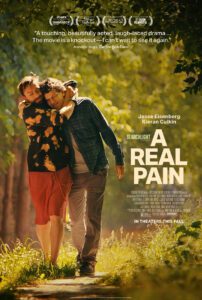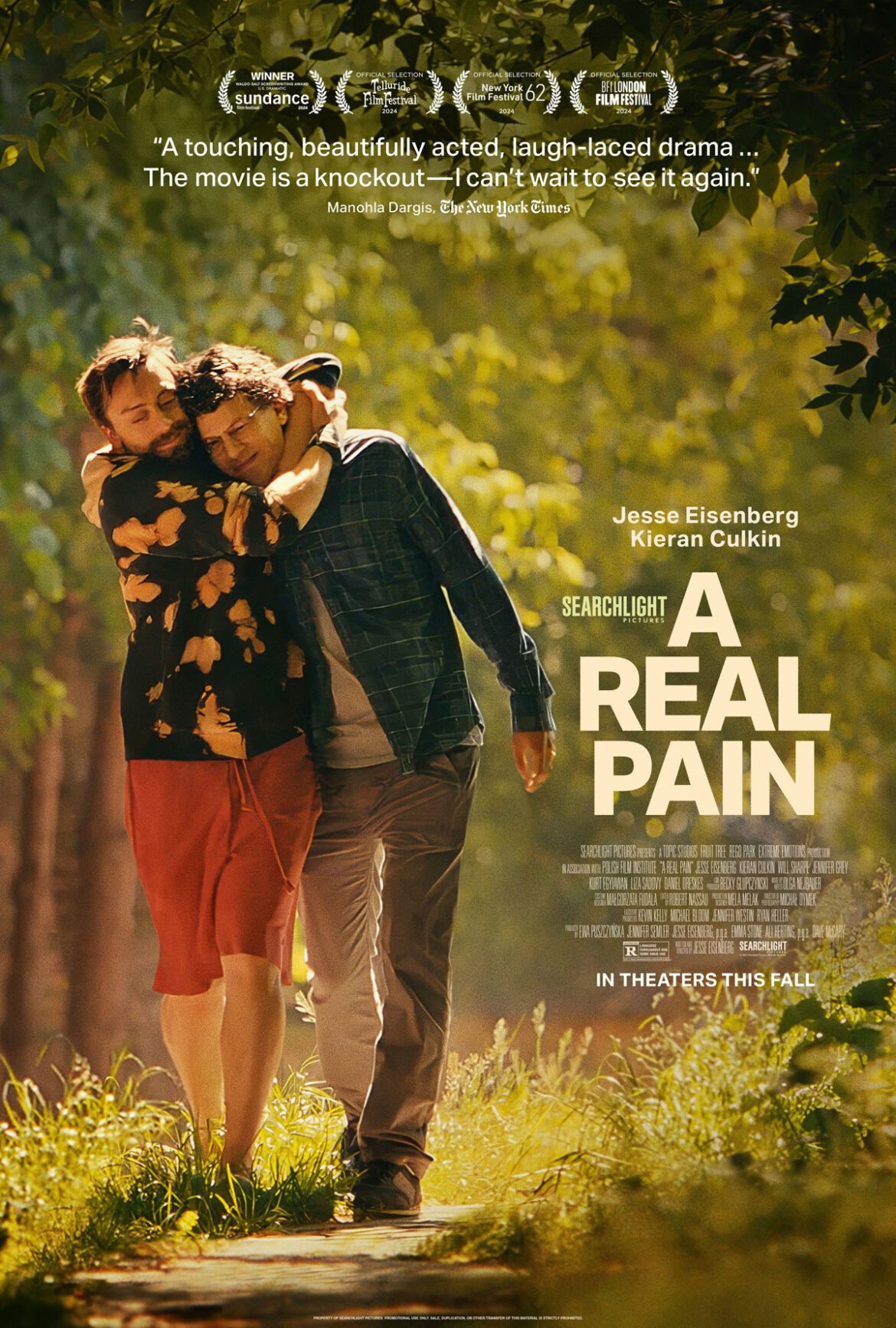
Director: Jesse Eisenberg
Release Year: 2024
Runtime: 1h 30min
Remember back when we had talky-talky indie movies? Back before everything was dudes in masks and even the indie films had to have some sort of pizazz? Some sort of hook? Some sort of twist? Or just generally end with someone being murdered? No, seriously, there was a time where no “cool” indie film could end without a death. I blame 1994’s Shallow Grave. An excellent movie, but indicative of the thought that the only way to end a film without special effects was with a body or seven. I mean, it’s right there in the name. But A Real Pain dispenses with all that nonsense and just gives it to us straight. A simple, family road trip film with dialogue and acting and… human family stuff. You know, what we think of when we think of indie films. Or at least used to.
If you’ve ever read Everything is Illuminated (or seen its companion movie), you’ll recognize the bones of this film. A Jewish man in some state of stasis and/or grief goes back to the motherland, Poland, to find the story of a grandparent. You know, to understand himself better. Both stories are sad. Both are sweet. Both are funny. A Real Pain is a little less intentionally silly, but the two stories definitely live in the same very small pond. Tales about a personal life that ties to a much larger one that, in turn, informs that same small life. Nazis: they’re the fuckin’ worst. But in their terribleness, they spawned thousands of stories of survival and global lessons about the humanity and sprit in all of us. And, yes, there is some Nazi stuff in the film — including a visit to a death camp — but that’s not really what is at the heart of it. You honestly can’t avoid the topic when visiting certain countries looking back at generational trauma. It’s a film about family. About the different roads we can take. How we either overcome. Or don’t.
Yeah, I’m making this thing sound like a real bummer. But it’s not all doom and gloom. And that’s mostly due to Kieran Culkin. I’m not exactly sure what Jesse Eisenberg was thinking casting him as his Jewish cousin — or, frankly, his cousin at all — but man, that was one stroke of casting genius. And I’ll even put aside my whole “are there really no Jewish actors in Hollywood who could have filled this Jewish-focused role?” complaint and just bathe in the performance that is Culkin. Because this movie is a throwback talky-talky indie film that really rests on the acting of the two leads. No explosions. No overly intricate plotting. Just two 40-year-old white dudes talking on screen. With Eisenberg, you know exactly what you’re going to get. That sharp, nervous energy and incredibly precise delivery of dialogue. The nerd filled with internal turmoil, one moment cocksure and smarter-than-though, the next hanging onto his shit by his fingernails while dry-swallowing his anxiety meds. That’s David Kaplan — and almost every Eisenberg character — in a nutshell. He’s a family man, but even in his normalcy, his grip on that normal life feels tenuous. Eisenberg wrote and directed the film, so we have to assume this is who he is, or at least how he sees himself.
But it’s Culkin’s portrayal of Benji Kaplan that will get all the roses. A character, when you think about it, could be an alternative universe version of his Roman Roy character from Succession. A charismatic dude who has the ability to charm with his sense of humor and ability to make others feel good about themselves, but who ultimately self-sabotages, exposing himself as an individual whose empathy and ability to read people comes from a deep, dark well of brokenness. The chill guy who is a great hang… but only for a while. Because eventually that great time unravels and you realize the guy who only ever wears shorts and a flowered shirt and says what’s on his mind isn’t doing it because he’s chill or a free spirit, but because he’s a mess. So, while their tour group is pulled in by Benji’s radical transparency and friendly facade, David knows what’s going on under the surface and how things will eventually turn out. Because good-time Benji has an expiration date. Which sets up the main tension in the film between the cousins. The uptight David and his clear inability to engender warmth and connection with others versus his cousin Benji’s ability to immediately have people warm to him and be pulled in by his natural charisma. And David’s knowledge that all these people are in for an eventual rug-pull and disappointment when things with Benji go sideways. That he’ll then have to clean up. Which is a point of both jealousy in Benji’s ease, and also his frustration that Benji can do this so readily without having to suffer any of the backlash on the backend. Because, yes, Benji is, in life, a fuck up.
Culkin’s embodiment of this complicated duality jumps off the screen. His charisma and familiarity with other humans is perfectly played. And then his sadness, shame and a variety of other feelings just tumble out of him. He plays that type so well. The guy who walks around kind of just doing and saying whatever he wants with no interest in repercussions or norms. Not because he doesn’t think they apply to him, but because the construct just doesn’t make sense to him. You know those guys, where their opinions about things verge on misinformation or conspiracy theory. Like there’s no way Benji pays taxes. And when you’d say to him, “Dude, you have to pay taxes. You’ll get audited and…” And he’ll have the whole thing about how if you really look at the rules that taxes are voluntary and you actually don’t need to pay them because of these three points. And by the time he’s done, you’re almost convinced that you too don’t need to pay taxes. Because he doesn’t say it angrily or rant about the government, but just says it as a matter of fact. It’s akin to my buddy — who suffered with some serious mental health challenges — calmly explaining how he was going to put the farm industry and Big Ag out of business by growing vegetables hydroponically under his bed. He had me convinced — but I was 19 and didn’t understand the whole idea of scale and the reality of growing enough to sustain you under a double bed in an apartment in Westwood. Stoner logic. Anyhow, Culkin embodies it to the point you feel he is that guy, the same way David probably actually is Eisenberg.
Generationally and background-wise, this movie spoke to me. My family came from Eastern Europe (including parts of Poland) in the late 1800s, so the parallel isn’t exactly there, but I imagine I had relatives who once lived in these same areas and left behind friends and more distant family that lived these same lives as Grandma Kaplan. So I was probably inclined to connect to the film right off the bat. But, more than that, it felt like what smaller indie movies should be. Good writing. Great acting. And a story that involves not a single laser or gunshot. Just a straight-forward tale about family, regret and moving on that ends ambiguously. Just like real life.

